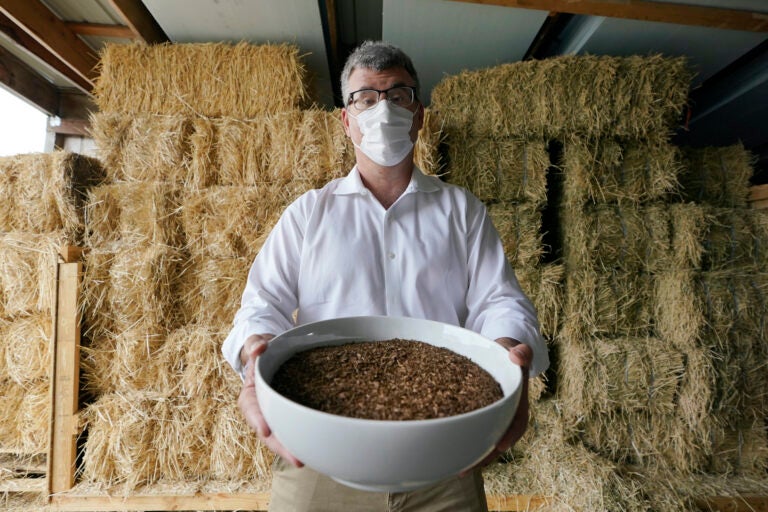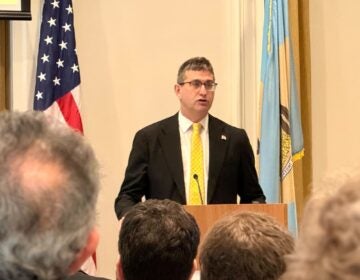Human composting? Legislation allowing organic cremation heads to Del. Gov. John Carney’s desk
The legislation allows an environmentally-friendly cremation option that turns the body into soil. It passed with bipartisan support in both chambers.

Micah Truman, CEO of Return Home, a company that composts human remains into soil, poses for a photo, Wednesday, Sept. 15, 2021, in Auburn, Wash., south of Seattle. Truman is holding a container of soil made with animal remains that is used to show what the product of their process looks like. Behind him are bales of straw, which is used in the two-month composing process. (AP Photo/Ted S. Warren)
This story was supported by a statehouse coverage grant from the Corporation for Public Broadcasting.
From Philly and the Pa. suburbs to South Jersey and Delaware, what would you like WHYY News to cover? Let us know!
Legislation that would allow Delaweans to choose to be composted into soil instead of buried or cremated is headed to Gov. John Carney’s desk.
It passed the state Senate Thursday after a spirited debate, with all of the Democrats and Republican Eric Buckson voting yes. The House approved it overwhelmingly in January.
The process is also known as natural organic reduction, which supporters say is a more environmentally-friendly “death care option.” Like traditional cremation, the remains are returned to family members or whoever arranged for it.
Senate Sponsor Sen. Laura Sturgeon, D-Brandywine West, said the choice is already available in seven other states, and the soil will undergo extensive testing. Citing figures from those in the industry and government researchers, Sturgeon argued other internment options, such as burial and traditional cremation harm the earth and climate.
“Cremation is a fossil fuel-driven process, with each cremation emitting 535 pounds of carbon dioxide,” she said. As for traditional burial, every year in the United States, we bury over 100,000 gallons of formaldehyde, 104,000 tons of steel, 1.6 million tons of reinforced concrete, and 30 million board feet of hardwood. People who want to choose natural organic reduction do so because it aligns with their personal values.”
The organic reduction process usually takes about four to six weeks and involves using a large tank or container to hold the remains along with straw, wood chips and other natural material. The remains and natural material would be mixed with warm air and shifted until a soil-like material is produced. The soil could be used in gardening or planting a tree.
Some Republican senators objected to the legislation on moral and other grounds.
“I have a really tough time accepting the idea of composting a human body,” Republican Sen. Dave Lawson said. “It just doesn’t comport with my upbringing, my religion, and my belief that God designed us, and we deserve a bit more respect than being turned into tomato food.”
Lawson sarcastically said one environmentally-friendly solution to unsustainable death care options was located at his farm.
“We can bypass the composting,” he said. “I’ve raised hogs, they’ll eat anything.”
Sen. Stephanie Hansen said soil is necessary to growing plants, supporting bugs and mammals who need the food from the garden.
“The idea that we have a bias against, ‘Well, we don’t want to be dirt,’ that we need to start thinking about that a little differently,” she said. “We need to cast that differently. Because it is so much more important to us. It is foundational. So I think this is a good time for us to start thinking about it in a slightly different way.”
If Carney signs the bill, it won’t take effect for a year or until regulations are finalized for implementation.

Get daily updates from WHYY News!
WHYY is your source for fact-based, in-depth journalism and information. As a nonprofit organization, we rely on financial support from readers like you. Please give today.







